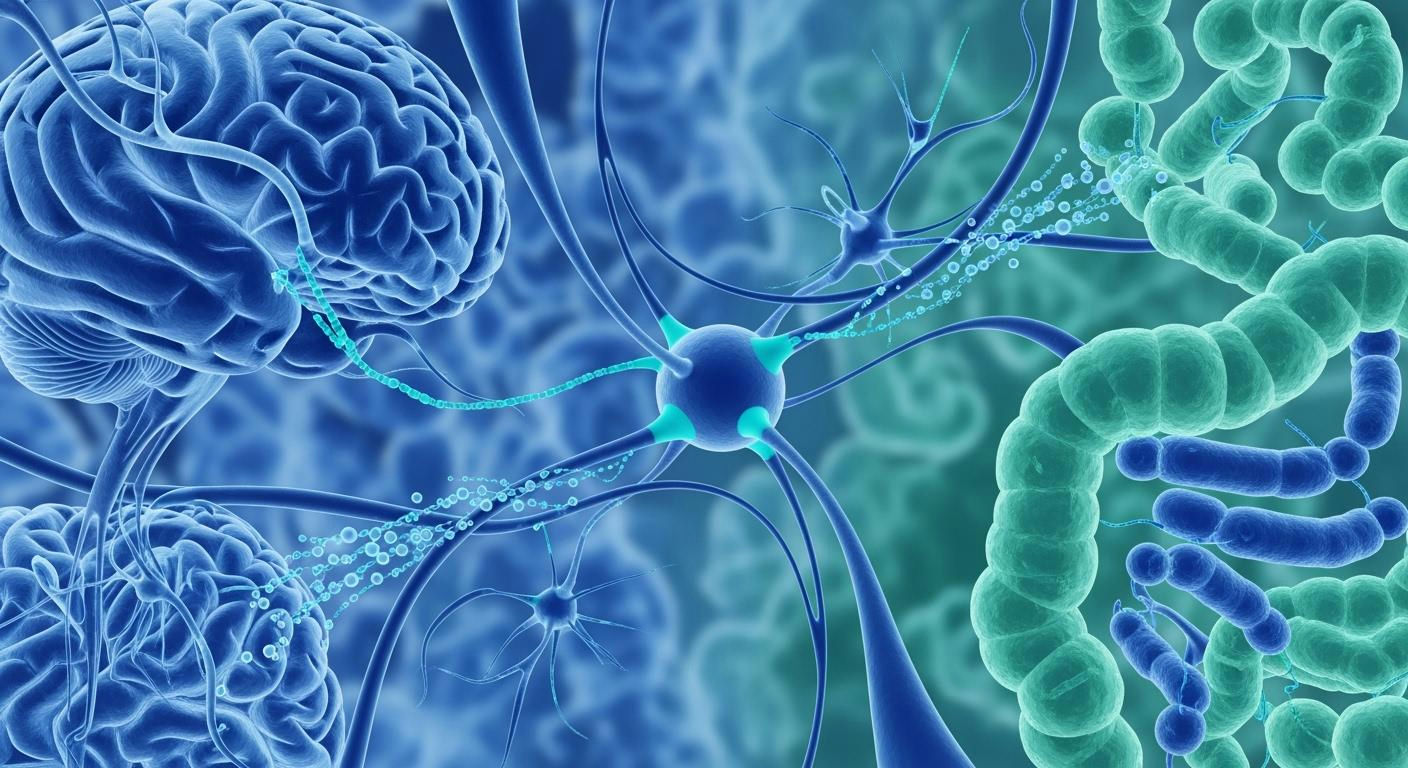The Microbiome-Brain Connection: How Your Gut Bacteria Influence Mental Health and Cognitive Function
The Microbiome-Brain Connection: How Your Gut Bacteria Influence Mental Health and Cognitive Function
Executive Summary
Emerging research reveals that your gut microbiome—the trillions of bacteria residing in your digestive system—significantly impacts your mental health and cognitive function. This article explores how these microorganisms communicate with your brain, influence mood and cognition, and offers practical strategies to nurture this connection for better mental wellness.
Table of Contents
- Understanding Your Gut’s Second Brain
- The Mental Health Connection
- Signs Your Gut-Brain Axis Needs Support
- Nurturing Your Microbiome for Mental Wellness
- When Professional Support Makes a Difference
- 30-Day Gut-Brain Health Plan
- The Future of Gut-Brain Health
- Creating Your Personal Gut-Brain Wellness Strategy
- Taking the Next Step
- Frequently Asked Questions
Have you ever experienced “butterflies” in your stomach before a big presentation? Or noticed how stress seems to wreak havoc on your digestion? These common experiences hint at something profound that scientists are now beginning to fully understand: your gut and brain are in constant conversation, and the trillions of bacteria living in your digestive system play a starring role in this dialogue.
Recent research reveals that the microorganisms in your gut—collectively known as your microbiome—do far more than help digest food. They produce neurotransmitters, influence inflammation, and communicate directly with your brain through multiple pathways. This intricate relationship affects everything from your mood and anxiety levels to memory and cognitive performance.
For many Canadians dealing with mental health challenges, understanding this gut-brain connection opens new doors for holistic wellness approaches. Let’s explore how these microscopic allies influence your mental wellbeing and discover practical steps you can take to nurture this powerful partnership.
Understanding Your Gut’s Second Brain
Your digestive system contains approximately 500 million neurons—that’s more than your spinal cord. Scientists often refer to this extensive network as the “second brain” or enteric nervous system. But the real stars of this system are the 100 trillion microorganisms calling your gut home.
These bacteria, along with viruses, fungi, and other microbes, make up your gut microbiome. Each person’s microbiome is as unique as their fingerprint, shaped by factors including:
- Birth method (vaginal delivery vs. C-section)
- Early childhood diet and antibiotic exposure
- Current dietary patterns
- Stress levels and sleep quality
- Physical activity
- Medication use
The Communication Highway
Your gut and brain communicate through several pathways:
The Vagus Nerve:
This superhighway of information runs directly from your gut to your brain, transmitting signals in both directions. Approximately 90% of the fibers in the vagus nerve carry information from the gut to the brain, not the other way around.
Neurotransmitter Production:
Your gut bacteria produce many of the same neurotransmitters found in your brain, including:
- Serotonin (90% of your body’s serotonin is made in the gut)
- GABA (helps regulate anxiety)
- Dopamine (influences motivation and reward)
- Norepinephrine (affects alertness and arousal)
The Immune System:
About 70% of your immune system resides in your gut. When your microbiome is imbalanced, it can trigger inflammation that affects brain function.
Metabolites and Short-Chain Fatty Acids:
Beneficial bacteria produce compounds that can cross the blood-brain barrier and directly influence brain health.
Care& Tip: Track Your Gut-Brain Connection
Use the Health Metrics feature in the Care& app to monitor how dietary changes affect both digestive symptoms and mood patterns over time. This data can help identify your unique gut-brain connections.
The Mental Health Connection: What Research Reveals
The growing body of research linking gut health to mental wellbeing is compelling. Studies have found distinct differences in the gut microbiomes of people with various mental health conditions compared to those without.
Depression and the Microbiome
Research published in Nature Microbiology identified specific bacterial strains that were consistently depleted in people with depression. These bacteria produce butyrate, a compound that helps maintain the gut lining and has anti-inflammatory effects throughout the body, including the brain.
A Canadian study from McMaster University found that transplanting gut bacteria from humans with depression into mice caused the animals to develop depression-like behaviors. This groundbreaking research suggests our gut bacteria don’t just correlate with mental health—they may actively influence it.
Anxiety and Gut Diversity
People with anxiety disorders often show reduced diversity in their gut microbiome. This lack of microbial variety can affect the production of calming neurotransmitters like GABA. Studies have shown that certain probiotic strains, particularly Lactobacillus and Bifidobacterium species, can help reduce anxiety symptoms by supporting GABA production and reducing inflammation.
Cognitive Function and Brain Fog
The gut-brain connection extends beyond mood to cognitive performance. Research indicates that an imbalanced microbiome can contribute to:
- Difficulty concentrating
- Memory problems
- “Brain fog” or mental fatigue
- Reduced cognitive flexibility
The mechanisms involve inflammation, altered neurotransmitter production, and changes in the blood-brain barrier’s permeability.
Signs Your Gut-Brain Axis Needs Support
Recognizing when your gut-brain connection might be out of balance is the first step toward improvement. Watch for these interconnected symptoms:
Digestive and Mental Health Symptoms Often Occur Together
- Persistent digestive issues alongside mood changes
- Increased anxiety during periods of digestive distress
- Brain fog accompanying gut symptoms
- Food cravings, especially for sugar, paired with mood swings
Physical Symptoms That May Indicate Imbalance
- Frequent infections or slow healing
- Skin problems like eczema or acne
- Unexplained fatigue
- Sleep disturbances
- Headaches or migraines
Behavioral Patterns to Notice
- Feeling “hangry” (angry when hungry) more intensely
- Dramatic mood shifts after certain meals
- Digestive symptoms during stressful periods
- Difficulty managing stress compared to the past
Concerned about your gut-brain connection?
If you’re experiencing several of these symptoms, it might be time to discuss them with a healthcare provider. Care&’s Nurse Practitioners offer unlimited appointment time to thoroughly address your concerns and develop a personalized approach.
Nurturing Your Microbiome for Mental Wellness
The good news is that your microbiome is remarkably responsive to positive changes. Unlike your genetic code, which remains fixed, your gut bacteria can shift significantly within days or weeks of implementing healthier habits.
Dietary Strategies for a Healthy Gut-Brain Axis
Embrace Diversity on Your Plate
Research shows that people who eat 30 or more different plant foods per week have more diverse microbiomes. This doesn’t mean 30 different vegetables—it includes:
- Fruits and vegetables
- Whole grains
- Nuts and seeds
- Herbs and spices
- Legumes
Prioritize Prebiotic Foods
Prebiotics are fibers that feed beneficial bacteria. Excellent sources include:
- Jerusalem artichokes
- Garlic and onions
- Asparagus
- Bananas (especially slightly green ones)
- Oats and barley
- Apples
Include Fermented Foods Daily
A Stanford University study found that eating fermented foods increased microbiome diversity more effectively than a high-fiber diet alone. Try incorporating:
- Plain yogurt or kefir
- Sauerkraut or kimchi
- Kombucha (watch sugar content)
- Miso or tempeh
- Fermented pickles
Limit Microbiome Disruptors
Certain foods and substances can negatively impact your gut bacteria:
- Artificial sweeteners
- Excessive alcohol
- Highly processed foods
- Foods high in added sugars
- Unnecessary antibiotics (always complete prescribed courses)
Lifestyle Practices for Gut-Brain Health
Stress Management Is Non-Negotiable
Chronic stress dramatically alters your microbiome composition. Effective stress-reduction techniques include:
- Regular meditation or mindfulness practice
- Deep breathing exercises
- Yoga or tai chi
- Time in nature
- Creative activities you enjoy
At Care&, we understand that managing stress often requires professional support. Our Nurse Practitioners take time to discuss stress management strategies that work with your lifestyle, offering unlimited appointments to help you develop sustainable wellness practices.
Prioritize Quality Sleep
Your gut bacteria follow circadian rhythms just like you do. Poor sleep disrupts these rhythms and can lead to microbiome imbalances. Aim for:
- 7-9 hours of sleep nightly
- Consistent sleep and wake times
- A cool, dark sleeping environment
- Limited screen time before bed
Move Your Body Regularly
Exercise positively influences microbiome diversity. Canadian Physical Activity Guidelines recommend at least 150 minutes of moderate-intensity activity weekly. Even gentle activities like walking can benefit your gut bacteria.
Consider Targeted Supplementation
While food should be your primary source of gut support, certain supplements may help:
- Probiotic supplements (strain-specific for your needs)
- Omega-3 fatty acids
- Vitamin D (especially important for Canadians)
- Magnesium
Always consult with a healthcare provider before starting new supplements, as they can interact with medications or health conditions.
Track Your Gut-Brain Connection with Care&
Our app allows you to monitor digestive symptoms alongside mood patterns, helping you identify connections and track improvement as you implement changes.
When Professional Support Makes a Difference
While lifestyle changes can significantly impact your gut-brain health, certain situations warrant professional guidance:
Seek Healthcare Support When Experiencing:
- Persistent digestive issues lasting more than two weeks
- Significant mood changes affecting daily life
- Unexplained changes in appetite or weight
- Chronic fatigue despite adequate sleep
- Recurring infections or slow wound healing
The Value of Comprehensive Assessment
Understanding the gut-brain connection often requires looking at the whole picture of your health. This includes:
- Detailed health history
- Current symptoms and their patterns
- Dietary habits and lifestyle factors
- Stress levels and coping mechanisms
- Current medications and supplements
For Toronto residents seeking comprehensive care that addresses both physical and mental wellbeing, having a healthcare provider who takes time to understand these connections can make a significant difference. Care& Family Health’s Nurse Practitioners are trained to consider these holistic health connections, with unrushed appointments that allow for thorough discussion of your concerns.
How Care& Can Support Your Gut-Brain Health
✓ Unrushed Appointments
Our Nurse Practitioners provide unlimited appointment time to thoroughly discuss your concerns and symptoms.
✓ Personalized Approach
We develop customized strategies based on your unique health history, lifestyle, and goals.
✓ Ongoing Support
Use our secure chat feature to ask questions between appointments as you implement changes.
✓ Comprehensive Testing
Access to relevant lab work to help identify specific factors affecting your gut-brain health.
Practical Implementation: Your 30-Day Gut-Brain Health Plan
Making sustainable changes doesn’t require overhauling your entire life overnight. Here’s a practical approach to improving your gut-brain connection:
Week 1: Foundation Building
- Start a simple food and mood journal
- Add one fermented food to your daily routine
- Begin a
5-minute daily stress-reduction practice - Ensure you’re drinking adequate water (aim for 2-3 liters daily)
Week 2: Dietary Diversity
- Count the different plant foods you eat this week
- Add 5 new plant foods to your grocery list
- Try one new prebiotic-rich recipe
- Reduce artificial sweeteners if you use them
Week 3: Lifestyle Integration
- Establish a consistent sleep schedule
- Add 10 minutes to your daily movement
- Practice mindful eating at one meal daily
- Connect with others (social connection supports gut health)
Week 4: Fine-Tuning
- Review your food and mood journal for patterns
- Adjust strategies based on what’s working
- Consider professional guidance for persistent concerns
- Celebrate the positive changes you’ve noticed
Need help tracking your 30-day plan?
The Care& app includes features to help you monitor your food intake, mood patterns, and physical symptoms all in one place. Track your progress and identify connections between what you eat and how you feel.
The Future of Gut-Brain Health
Research into the microbiome-brain connection is rapidly evolving. Scientists are exploring:
- Personalized probiotic treatments based on individual microbiome testing
- The role of gut bacteria in neurodegenerative diseases
- How early-life microbiome development affects lifelong mental health
- Targeted interventions for specific mental health conditions
As our understanding grows, healthcare approaches are becoming more integrative, recognizing that mental and physical health are inseparable.
Creating Your Personal Gut-Brain Wellness Strategy
Everyone’s microbiome is unique, which means your optimal gut-brain health strategy will be personal to you. Consider these factors when developing your approach:
Your Current Health Status
- Existing digestive conditions
- Mental health history
- Current medications
- Food sensitivities or allergies
Your Lifestyle Reality
- Time available for meal preparation
- Budget for food and supplements
- Work and family commitments
- Access to various foods
Your Health Goals
- Specific symptoms you want to address
- Overall wellness objectives
- Timeline for seeing improvements
- How you’ll measure success
Remember that improving your gut-brain connection is a journey, not a destination. Small, consistent changes often yield better results than dramatic overhauls.
Taking the Next Step
Understanding the profound connection between your gut and brain empowers you to take a more holistic approach to your health. Whether you’re dealing with mood challenges, cognitive concerns, or simply want to optimize your wellbeing, nurturing your microbiome offers a powerful path forward.
The journey to better gut-brain health doesn’t have to be navigated alone. If you’re experiencing persistent symptoms or want personalized guidance, having a healthcare provider who understands these connections can accelerate your progress. At Care& Family Health, our approach to primary care recognizes these vital connections, offering the time and expertise to help you develop a comprehensive wellness strategy that works for your unique situation.
Your gut bacteria are constantly adapting and changing, which means it’s never too late to improve your gut-brain health. By implementing even a few of the strategies discussed here, you’re taking meaningful steps toward better mental clarity, emotional balance, and overall wellbeing.
Ready to optimize your gut-brain connection?
Care& Family Health offers comprehensive primary care with a focus on the connections between physical and mental wellness. Our Nurse Practitioners provide the time, expertise, and support you need to implement sustainable health changes.
Frequently Asked Questions
Q: How long does it take to see improvements in mental health after changing my diet to support gut health?
While everyone’s timeline differs, many people notice initial improvements in energy and digestion within 1-2 weeks of dietary changes. More significant mental health benefits, such as reduced anxiety or improved mood stability, typically emerge after 4-8 weeks of consistent healthy eating patterns. The key is persistence—your microbiome needs time to shift toward a healthier balance. Keeping a symptom journal can help you track subtle improvements you might otherwise miss.
Q: Can probiotics replace antidepressants or anti-anxiety medications?
Probiotics should never replace prescribed medications without medical supervision. While research shows promising connections between gut health and mental wellness, probiotics work differently than psychiatric medications. They’re best viewed as a complementary approach that may enhance overall treatment effectiveness. At Care&, our Nurse Practitioners can help you explore how gut health strategies might fit into your comprehensive mental health plan, ensuring safe integration with any current treatments.
Q: Are there specific signs that indicate my mental health symptoms might be connected to gut issues?
Several patterns suggest a gut-brain connection: mental health symptoms that worsen after eating certain foods, anxiety accompanied by digestive issues, brain fog following meals, or mood changes during antibiotic use. Additionally, if you have a history of digestive problems predating mental health concerns, or if stress immediately affects your digestion, these indicate a strong gut-brain link worth exploring with a healthcare provider.
Q: How can I tell if I need professional help versus trying dietary changes on my own?
While general dietary improvements benefit most people, seek professional guidance if you experience: severe or worsening mental health symptoms, persistent digestive issues lasting over two weeks, unexplained weight changes, or symptoms interfering with daily activities. Additionally, if you have existing health conditions or take medications, professional oversight ensures your gut health approach is safe and effective. Care&’s comprehensive approach includes on-site lab services that can help identify specific health markers when needed.
Q: What’s the most important first step for a busy person wanting to improve their gut-brain health?
Start with one sustainable change rather than attempting everything at once. For most busy individuals, adding a daily fermented food (like yogurt with breakfast or kimchi with lunch) provides an easy entry point. Pair this with a simple 5-minute stress-reduction practice, such as deep breathing before meals. These small steps can create noticeable improvements while building momentum for additional changes. Remember, consistency matters more than perfection in supporting your microbiome.
Less Wait Time, More Face Time
Visit www.careand.ca to register
Disclaimer: This article is for informational purposes only and does not constitute medical advice. Always consult with a qualified healthcare provider for personal medical guidance. The information provided is general in nature and may not apply to individual circumstances.







